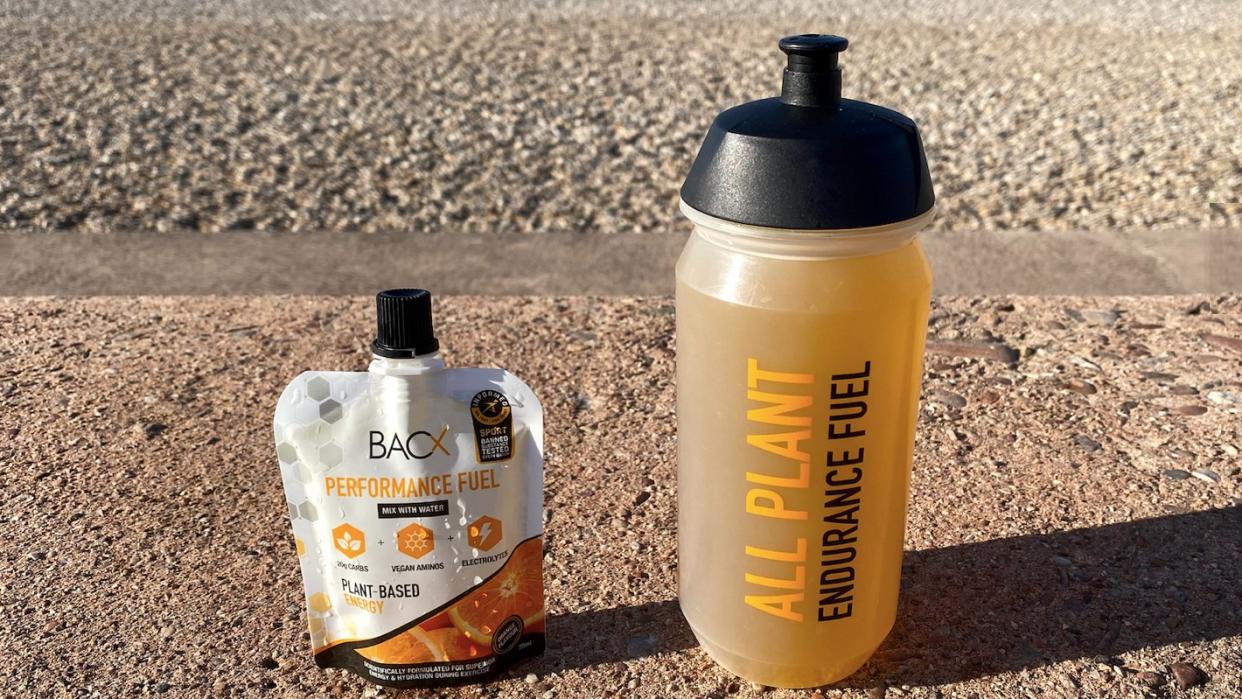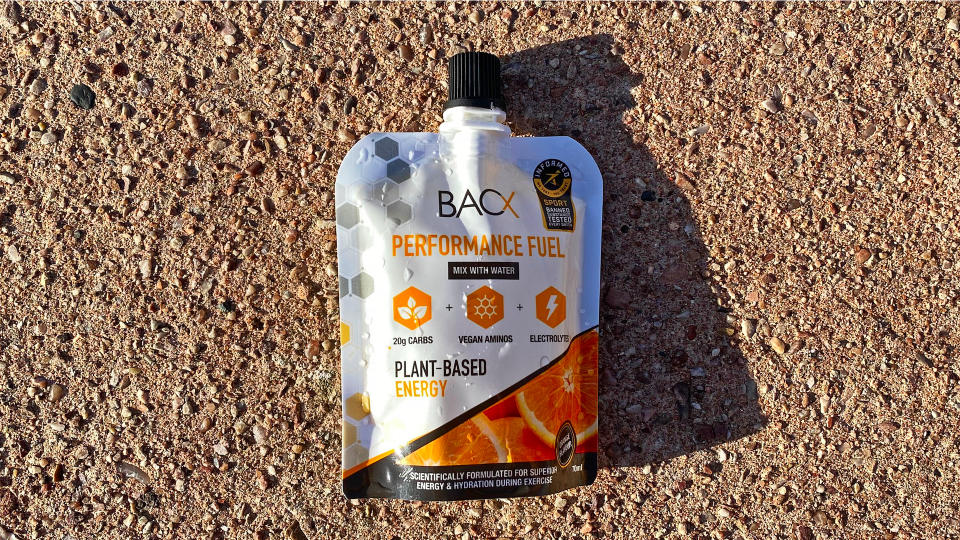BACX Performance Fuel review: tasty and effective

- Oops!Something went wrong.Please try again later.
BACX Performance Fuel: first impressions
If you’ve seen any of the promotional material for BACX Performance Fuel – a plant-based energy drink new to the active nutrition market – you’ll know the mix has been loudly championed by F1 driver Sebastian Vettel, who became a major investor in the company/product after using BACX exclusively while racing for Aston Martin during the 2022 season.
Specifications
• List price (per 10 sachets): £23.30 (UK) (not currently officially available in the the US)
• Size per sachet: 70ml
• Weight per sachet: 83g
• Flavors: Orange / Berry
• Energy per sachet: 387kj / 91kcal
• Carbohydrates per sachet: 20g (15.4g of which = natural sugars)
• Salt per sachet: 0.6g
• Fat per sachet: 0.1g
• Protein per sachet: 0.4g
Available in 70ml sachets, BACX Performance Fuel is designed to be mixed with water and consumed prior to and/or during exercise. BACX makes a big deal about the fuel’s natural and non-animal-product ingredients, which is presumably what originally appealed to Vettel, who once spent some time experimenting with a vegan diet suggested by fellow driver Lewis Hamilton.
Unlike Hamilton, Vettel is no longer a vegan, but he does claim BACX is the only supplement he’s ever used that supplied the requisite energy to get him through a Grand Prix race without giving him stomach problems (which suggests his poor pit crew may have had more to deal with than quick tire changes over the years).
Full ingredients
Water • Sweet Potato Juice Concentrate • Coconut Water Concentrate • Brown Rice Syrup • Agave Nectar • Carthamus (Safflower) Concentrate • Vegan Amino Acid Blend* • Natural Orange Flavoring • Natural Flavoring • Color: Carotenes • Acidity Regulator: Citric Acid • Sodium Citrate (* L-Leucine, L-Isoleucine, L-Valine, L-Arginine)
The drink supplement, which emanates from Oxford University and claims to have been subjected to thousands of hours of laboratory scrutiny, is also enthusiastically endorsed by other sportsfolk and athletes, including Team GB track cyclist and Commonwealth medalist Joe Truman.
But, while all this backing for BACX by well-known sporty types is impressive, we’re not, of course, simply going to take their word for how good it is. To assess it for ourselves, and to see whether it should be included in our guide to the best active nutrition, I’ve been swigging on the elixir before and during a number of active days out on the trails. Here’s what I found out.
BACX Performance Fuel: in the field

A lot of the press around this product is about what the syrup hasn’t got in it (there are no artificial preservatives, colors and flavors, nor so much as a whiff of caffeine or maltodextrin), which is all well and good. Personally I always avoid running gels and drinks with caffeine in them before a taking on a demanding activity, such as running or bike riding, because I find it can irritate my stomach and cause dehydration, and maltodextrin has a bad name as quick-burning carb that can cause or exacerbate allergies (see also what to eat while running for how eating and drinking at the right time can improve your runs).
But I was just as pleased to see what does feature in the ingredients, not least because I’m borderline addicted to oranges and sweet potatoes. There are only two flavors available at the moment: orange and berry. Some more options would be good, but it’s early days for BACX, and these may well be forthcoming at some point.
There’s a lot going on beyond the taste, though. Containing a complex cocktail of mostly natural foodstuffs, each 70ml serving of the syrupy concoction imparts 20g of carbohydrates, along with 1,200mg of vegan aminos and a 680mg burst of electrolytes.

Naturally, when it came to testing this elixir, I gravitated to the orange-flavored option, and once mixed with water, I found the taste very pleasant. The packaging recommends combining one sachet of BACX with a minimum of 200ml of water, but I found 500ml to be a good mix, especially for ingestion during exercise. These measures preserve the taste, while not making it overwhelming, and I found it easy and enjoyable to sip or gulp down when blended at this ratio.
Over the last few months, I’ve consumed umpteen bottles of BACX before and during a range of outdoor and sporting pursuits, including an all-day Taekwondo competition and a very punishing 26-mile / 42km off–road running event, during which I really appreciated the energy injection the drink gave me.
I’ve also been swigging it while hiking, biking and kayaking, and I can report that the benefit from using the drink supplement was tangible, and my post-exercise recovery was rapid. The drink is heavy on carbs, while being gentle on your stomach, and I suffered none of the nasty side effects that I have previously experienced with some gels – details of which I will spare you.
BACX nutrition proudly proclaim their sachet packaging is recyclable, which it technically is, but being made of polypropylene, you can’t just chuck it in your green bin – you need to check with your local authority about how to recycle it.

